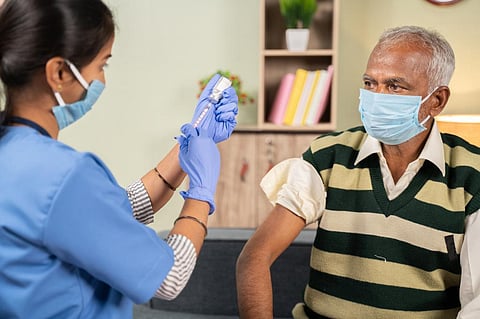

Several anecdotal reports linking sudden unexplained deaths in India during the COVID-19 pandemic to its vaccines have been proven untrue by an Indian Council of Medical Research (ICMR) study.
Past COVID-19 hospitalisation, family history of sudden death, lifestyle behaviours like binge drinking, drug or substance abuse and physical activities of vigorous intensity 48 hours before death were some of the factors that significantly increased the odds of unexplained sudden death among young adults aged between 18-45 years, the ICMR said in the paper.
“Habitual exercise reduces the risk of sudden cardiac deaths (SCD), but unaccustomed vigorous-intensity physical activity is known to increase its risk,” said lead author Manoj Murhekar, director of the National Institute of Epidemiology based in Chennai and affiliated with ICMR, told Down to Earth (DTE).
“Alcohol is known to have an immediate effect on cardiac rhythm and previous studies have found that a notable proportion of SCD occur after alcohol intake,” Murhekar told DTE.
The study was conducted in 47 tertiary care hospitals across India, with 729 people who had died unexpectedly after contracting COVID-19 and 2,916 controls in the analysis. The COVID-19 death cases included healthy individuals aged 18-45 years without any known co-morbidity, who suddenly died of unexplained causes between October 1, 2021, and March 31, 2023.
“Our findings did not indicate any evidence of a positive association of unexplained sudden death with the COVID-19 vaccination. However, a history of sudden death in the family, COVID-19 hospitalisation and certain high-risk behavioural factors were positively associated with unexplained sudden death among young Indians,” the researchers said.
Among the cases and controls, about 10 per cent and 4 per cent had a family history of sudden deaths, respectively. About 27 per cent of cases and 19 per cent of controls were smokers. Alcohol use was reported among 27 per cent of cases and 13 per cent of controls.
Binge drinking was reported in almost seven per cent of the cases and in a little over 1 per cent of the controls 48 hours before death or interview. Vigorous intensity physical activities in the past year was reported by 18 per cent of cases and 17 per cent of controls.
“We defined vigorous-intensity physical activity as any activity that caused large increases in breathing or heart rate for at least 10 minutes continuously and ascertained if the same was part of their routine work or undertaken in the past year and 48 hours before interview (controls) or death (cases),” the researchers explained.
A family history of sudden death was recorded if there were any first-degree relatives reported to have suddenly died within 24 hours of being healthy, the paper added.
A majority of the participants had been vaccinated once. About 2 per cent of cases and 1 per cent of controls were hospitalised for COVID-19 and 2 per cent of cases and 1 per cent of controls had a history of post-COVID-19 condition (PCC) a month after COVID-19 diagnosis.
The researchers used regression modelling analysis to show that patients with unexplained sudden deaths were four times more likely to have been hospitalised for COVID-19, whereas PCC was not associated. A family history of sudden death was almost three times more likely to be associated with unexplained sudden death.
The ICMR defined an unexplained sudden death as a natural, non-traumatic death of a healthy individual whose death either occurred in a hospital within 24 hours of hospitalisation or outside the hospital setting and who was seen to be healthy 24 hours prior. This includes people brought dead to the hospital.
“We excluded individuals with known medical condition(s) that can explain death, those taking long-term medications and those who died of injury, accident, poisoning, suicide, homicide or drug overdose. Further, for logistic reasons, we did not consider individuals residing in a locality requiring investigators to undertake more than a day’s travel (about 100 kilometres) from the study hospital,” the paper said.
The evidence of sudden deaths among individuals who had COVID-19 and breakthrough infections is scarce. The pathways through which COVID-19 may cause sudden deaths are currently not well understood. However, it has been hypothesised that severe acute respiratory syndrome coronavirus 2 (SARS-CoV-2) infection increases the risk of heart disease and stroke.
On a global scale, sudden deaths among healthy young adults are estimated to be between 0.8 and 6.2 per 100,000 people annually. Cardiovascular causes were behind these deaths too; these include arrhythmia, myocardial ischemia, cardiomyopathy, myocarditis, aortic aneurysm, and valvular diseases.